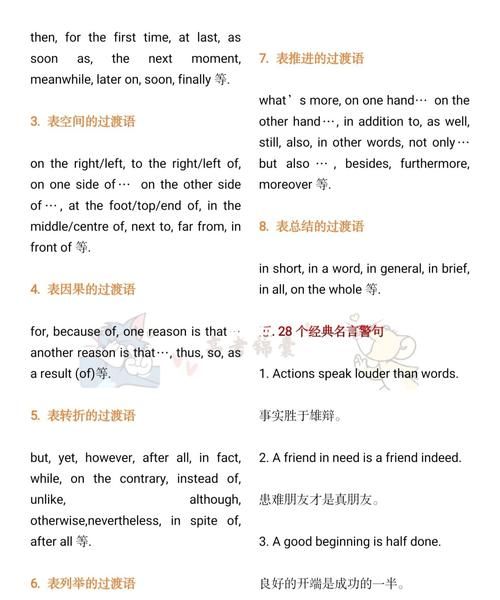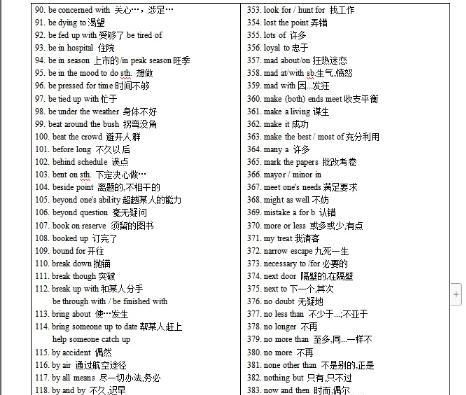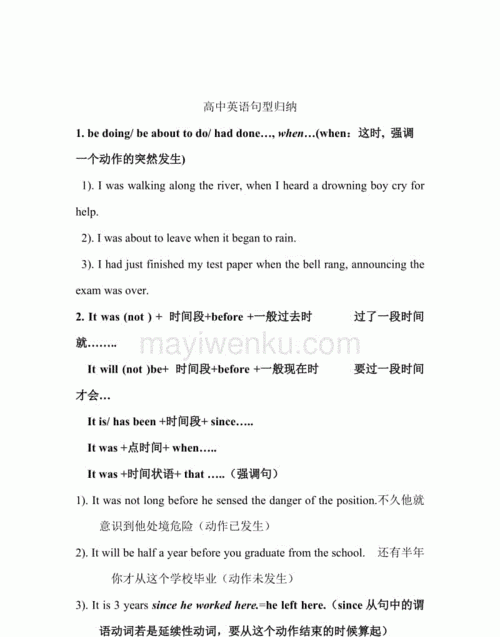本文目录
高中英语重点句型归纳总结
1、Although the four countries do work together in some areas,they are still very different.
although 引导让步状语从句:虽然这四个国家确实在某些领域合作,但它们仍然非常不同。
2、as if / though 引导的状语从句,时常用虚拟语气,表示与事实不符或相反的情况
He spoke in that way as if he were a foreigner. 他讲话的方式就好像是老外。
3、as + adj. + a + 可数单数名词 + as … :as---as 像---一样:第一个as是副词,修饰形容词或副词的原级;
第二个as是连词,引导比较状语从句。在否定句中也可以改为not as(so)---as-----.
The film was not as/so good as I had expected. 这部电影不如我预期的好。
4、be about to do sth…when… 正要干……这时…… when == at that time
I was about to leave when the manager called me back. 我正要离开时,经理叫住了他。
5、believe it or not 信不信由你,用于口语中,相当于插入语
Believe it or not, he asked me to tell you a lie! 信不信由你,他要我向你说谎!
6、can / could have done 表示对过去发生的行为进行推测,“可能”。一般用于否定句和疑问句
He can’t / couldn’t have done it because he was an honest man.
(1)must have done常用于肯定句,“一定” It must have been very late when he left the office.
(2)may / might have done 可能、也许,用于否定和肯定句中 He may / might have heard it from Mary.
(3)should have done表示“本该做某事,而结果未做”,否定句表示“不该做某事而结果做了”
He should not have taken the old clothes away. 他不该把旧衣服带走。(事实上已带走啦)
(4)needn’t have done 本来不需要---,但是做了… He needn’t have done his homework yesterday.
7、even if / though--- -即使、虽然
Even if we can go out for play, we won’t do. 即使我们能出去玩,我们也不想去。
8、Exhausted, I slid into bed and fell fast asleep. 由于太累了,我倒在床上马上就睡着了。
exhausted表原因,相当于一个原因状语从句As I was exhausted
9、Finding that Zhinu was heart-broken , her mother finally decided to let the couple cross the Milky Way to meet once a year.
Finding that Zhinu was heart-broken 是现在分词短语作原因状语,表主动动作。主句的主语与v.-ing有逻辑上的主谓关系
10、He couldn’t have Yong Hui getting away with telling people lies! 他不能让永慧跟别人说谎而置之不理。
(1)have sb. doing sth. 让某人做某事,表示一个持续的动作。放在否定句中表示不允许某人干某事。
(2)have sb. do sth. 让某人做某事(省略to的不定式),指做一次性的具体动作;
I’d have you know that I am ill. 我要让你知道我病了。
11、He got interested in two theories explaining how cholera killed people.
他对两个关于霍乱为什么能致人于死地的理论感兴趣。
how 引导的特殊疑问句是宾语从句
12、 However + adj. / adv. + 主语 + 谓语
however = no matter how无论如何,不管怎样,引导让步状语从句
However/No matter how cold it is, he always goes swimming.
13、主语 + be + adj.+ to do Tom is pleasant to work with. 与汤姆共事很令人愉快。
14、If so so用if 之后,代替前面的分句或句子,构成缩略条件句,语义可由上下文语境得知。
Will you get a free evening next week? If so, let us have dinner.
15、in search of 寻找,寻求
I’m always in search of someone who has the same hobby with me.
16、It is time -----
(1)It is time to do sth. 到了---的时间啦。
(2)It’s time (for sb.)to do sth. 到了某人干----的.时间啦。 It’s time for us to have a lesson.
(3)It’s (high/about) time that 从句到了某人干----的时间啦
(4)It /That/This/was/is the first/second----time that---- 这是某人第一、第二---次做某事 It’s the first time that I have been here.
17、It is too bad you can’t go as far as Ottawa. as far as 有三层基本的意思
(1)到某一指定的地点;远达 He walked as far as the park. 他步行到花园。
(2)同样的距离 We didn’t go as far as others. 我们不如别人走的远。
(3)程度、范围。就----而言,至于。也可以写做 so far as
As / So far as I know, he isn’t coming to the party. 据我所知,他不会出席这个晚会了。
18、It / This / That is the + 序数词 + time that 这是某人第一次/第二次/第三次做某事。
该结构中,that引导的从句为定语从句,通常用完成时态。time亦可为其它名词所替代
This is the first time (that) I’ve felt really relaxed for months. 几个月来这是头一次我真的感到轻松了。
It was the third time that he has fallen in love that year. 这是他那一年第三次谈恋爱了。
19、It looked splendid when first built. 刚建起来的时候很辉煌。
(1)本句是一个复合句,when引导时间状语从句;
(2)When first built是When it was first built的省略
Be careful when(you are)crossing the street.?过街时要当心。
20、It was obvious that the manager of the coffee shop was waiting for Li Fang to leave…
句子中it作形式主语,其后的从句才是句子的真正主语。
(1)It’s a pity (a shame a fact a wonder...) that...
It’s no harm drinking running water in that area.在那个地区喝自来水是无害的。
(2)It is strange (obvious true good possible likely clear...) that...
It is easier to say than to do.说比做容易。
(3)It seems (happened turned out occurred to me) that...
It seems that it is going to rain a moment later.
(4)It is said (reported decided expected...) that.
It is said that the tickets have been sold out.据说票已售完。

高考英语常考句型300句
高中英语:高考英语常考60个句型+例句
高中英语入门超级重要的60个句型,附有例句,不爱记语法理论的同学,一定要多背自己不熟悉的句式。
1. as…as 和……一样
中间必须用形容词或副词原级。例如:
This classroom is as big as that one.
这间教室和那间一样大。
He runs as fast as Tom.
他和汤姆跑的一样快。
否定结构:not as/so…as,“不如……”。上面的两个句子可分别改为:
This classroom is not as/so large as that one.
这间教室不如那间大。
He doesn’t run as/so fast as Tom.
他跑得不如汤姆快。
2. as soon as 一……就……
用来引导时间状语从句。若主句是一般将来时,从句要用一般现在时。例如:
I’ll tell him the plan as soon as I see him.
我一看到他就告诉他这个计划。
He’ll go home as soon as he finishes his work.
他一完成工作就回家。
3. be busy/enjoy/hate/go on/finish doing sth. 忙于/喜欢/讨厌/继续/完成做某事
在enjoy, finish, hate, go on, be busy等词语后,一般用动词-ing形式作宾语。例如:
Lin Tao is busy making a model plane.
林涛正忙着做飞机模型。
My mother enjoys taking a walk after supper.
我妈妈喜欢晚饭后散步。
I hate watching Channel Five.
我讨厌看五频道。
When someone asked him to have a rest, he just went on working.
当有人让他休息一会儿时,他仍继续工作。
I have finished writing the story.
我已经写完了故事。
4. fill…with 用……装满......;be filled with 充满了……;be full of 充满了......
①be filled with 说明由外界事物造成的此种状态,表示被动。例如:
The box is filled with food.
盒子里装满了食物。
②be full of说明主语处于的状态。此外,还可表示程度,意为“非常”。例如:
The patient’s room is full of flowers.
那个病人的房间摆满了花。
The young man is full of pride.
那个年轻人非常骄傲。
③这两种结构还可以相互改写。例如:
I fill the box with food. The box is full of food.
5. be good/bad for 有利于/有害于……
此句型是:be+adj.+for+n.结构。例如:
Doing morning exercises is good for your health.
做早操对你的健康有益。
Always playing computer games is bad for your study.
总玩电脑游戏对你的学习不利。
6. be used to(doing) sth. 习惯于……
后必须接名词或动名词,可用于现在、过去、将来的多种时态。be 可用get,become来代替。例如:
He is used to life in the country.(He is used to living in the country.)
他习惯于乡村生活。
He will get used to getting up early.
他将会习惯于早起。
注意:be used to do 的意思是“被用来做……”。例如:
Wood is used to make paper.
木材被用来造纸。
7. both…and…两者都……
用来连接两个并列成分;当连接两个并列主语时,其后谓语动词用复数。例如:
Both the students and the teachers will go to the History Museum tomorrow.
不论老师还是学生明天都会去历史博物馆。
8. can’t help doing sth. 禁不住做某事
help在此的意思是“抑制,忍住”,其后接动词-ing形式。例如:
His joke is too funny. We can’t help laughing.
他的笑话太有趣了,我们禁不止笑了起来。
9. sth. costs sb. some money 某物花费某人多少钱
此句型的主语是物。cost一词带的是双宾语,它的过去式、过去分词和原型一样。
This book cost me five yuan.
这本书花了我五元钱。
10. either…or… 不是……就是……,或者……或者……
用来连接两个并列成分,当连接并列主语时,谓语动词与邻近的主语保持一致。
You may either stay here or go home.
你可以呆在这儿,也可以回家。
Either she or I am right. = Either I or she is right.
不是她对就是我对。
11. enough (for sb.) to do sth. 足够……做……
在此结构中,for用来引出不定式的逻辑主语。例如:
The ice isn’t thick enough for you to walk on.
这冰还没有厚到你可以在上面走的程度。
12. feel like doing sth. 想要做……
此处like为介词,后面跟动词-ing形式。此句型与would like to do sth.同义。例如:
I feel like drinking a cup of milk.
我想喝一杯牛奶。
13. feel/find/think it adj./n. to do sth. 认为某事……
在此结构中it为形式宾语,不定式短语作真正的宾语。例如:
I find it very interesting to play football.
我发现踢足球很有趣。
She thinks it her duty to help us.
她认为帮助我们是她的职责。
14. get ready for sth./to do sth.
get ready for sth.意为“为某事做准备”;get ready to do sth.意为“准备做某事”例如:
We are getting ready for the meeting.
我们正在为会议做准备。
They were getting ready to have a sports meet at that moment.
他们那时正准备开运动会。
15. get/receive/have a letter from 收到……的来信,相当于hear from
Did you receive a letter from John?
你收到约翰的来信了吗?
I got a letter from my brother yesterday.
我昨天收到了我弟弟的一封来信。
16. had better (not) do sth. 最好(别)做某事
had better为情态动词,其后需用动词原形。had better常用缩写,变成’d better,其否定形式是在其后直接加not。例如:
We had better go now. = We’d better go now.
我们最好现在走吧。
You’d better not go out because it is windy.
今天刮风,你最好别出去了。
17. have sth. done 使(某事)完成 (动作由别人完成)
sth.为宾语,done为过去分词作补语。例如:
We had the machine repaired.
我们请人把机器修好了。
注意区分:We have repaired the machine. 我们(自己)已经修好了机器。
18. help sb. (to) do sth./with sth. 帮助某人(做)某事,其中的to可以省略。例如:
I often help my mother with housework.
我常常帮助妈妈做家务。
Would you please help me (to) look up these words?
请你帮助我查查这些词好吗?
19. How do you like……? 你认为……怎么样?与what do you think of …?同义。例如:
How do you like the weather in Beijing?
你认为北京的天气怎么样? 你觉得这部新电影如何?
20. I don’t think/believe that… 我认我/相信……不……
其中的not是对宾语从句进行否定而不是对主句否定(否定前移)。that可省略。例如:
I don’t think it will rain.
我认为天不会下雨。
I don’t believe the girl will come.
我相信那女孩不会来了。
21. It happens that… 碰巧…… 相当于happen to do,例如:
It happened that I heard their secret.
可改写为:I happened to hear their secret
我碰巧听到了他们的秘密。
22. It’s/has been +一段时间+since从句 自从某时起做某件事情已经一段时间了
该句型中since引导的时间状语从句常用一般过去时。例如:
It’s twenty years since he came here.
他来这里已经20年了。
It has been six years since he married Mary.
他和玛丽结婚已经六年了。
23. It is +adj./n. + for sb. to do sth. 做某事对某人来说……
It是形式主语,真正的主语是不定式to do sth。例如:
It’s not easy for us to study English well.
对我们来说学好英语并不容易。
It’s a good idea for us to travel to the south.
去南方旅行对我们来说是个好主意。
24. It’s + adj. + of sb. to do sth.
It是形式主语,to do sth.是真正的主语, 当表语(即形容词)能对逻辑主语描述时,常用介词of,而不用for。例如:
It’s very polite of you to give your seat to old people.
你给老人让座,非常有礼貌。
25. It seems/appears (to sb) that… (在某人看来)好像……
此句中的it是主语,that引导的是表语从句。例如:
It seems that he is lying.
看样子他好像是在撒谎。
It appears to me that he never smiles.
在我看来,他从来没有笑过。
26. It is +数词+metres/kilometers long/wide… ……是多少米(公里)长(宽)
用来表示物体的长(宽,高),如数词大于一,名词要用复数。例如:
It is 20 metres long from this end to that end.
从这端到那端有二十米长。
27. It’s time for sb. to do sth. 是某人干某事的时候了
it是形式主语,真正的主语是动词不定式to do sth. 例如:
It’s time for the child to go to bed.
孩子该睡觉了。
比较下面两种结构:
① It’s time for + n. 例如:
It’s time for school.
②It’s time to do sth. 例如:
It’s time to go to school.
28. It takes sb. some time to do sth. 花费某人多少时间做某事
it是形式主语,真正的主语是动词不定式to do sth。例如:
It takes her fifteen minutes to walk to the bus stop from here.
从这儿走着到公交车站将花费她15分钟。
It took the old man three days to finish the work.
那个老人花了三天时间完成这项工作。
29. keep (on) doing sth. 一直坚持做某事
keep doing sth.一般用于静态动词。keep on doing sth.意为“继续不停地做某事”,一般用于动态动词,但二者的区别并不是很严格,有时可以互换。例如:
Don’t keep on doing such foolish things.
不要再做这样的傻事了。
He kept sitting there all day.
他整天坐在那里。
30. keep…from doing sth. 阻止......做某事
相当于stop…from doing sth., prevent…from doing sth. 在主动句中,stop和prevent后面的from可以省略,但在被动结构中,from不可以省略。例如:
Please keep the children from swimming in the sea.
请别让孩子到海里游泳。
The big noise outside my room stopped me from doing my homework.
屋外巨大的噪音使我不能做作业。
31. keep sb. doing sth. 让某人一直做某事
不可和keep sb.from doing sth.结构混淆。例如:
Why do you keep me waiting for a long time?
你为什么让我等了很长时间?
32. make sb. do sth. 使某人干某事
make意为“使”时,其后要有不带to的动词不定式。例如:
He made me work ten hours a day.
他让我每天工作10小时。
注意:上句如改为被动语态,则work 前的to不能省略。例如:
I was made to work ten hours a day.
33. neither…nor… 既不……也不……
当连接两个并列主语时,谓语动词与邻近的主语取得一致(就进一致原则)。例如:
Neither we nor Jack knows him.
我们和杰克都不认识他。
He neither knows nor cares what happened.
他对发生的事情不闻不问。
34. not…until… 直到……才......
until后可跟名词或从句,表示时间。例如:
He didn’t come until late in the evening.
他直到晚上很迟才来。
He didn’t arrive until the game began.
直到比赛开始他才来。
35. sb. pays money for sth. 某人花钱买某物
此句型主语是人。例如:
I’ve already paid 2,000 yuan for the motor bike.
我已经花了2000元买这辆摩托车。
36. spend time/money on sth./(in)doing sth. 花费(时间、钱)在某事上/做某事
其中in可以省略,通常主语为“人”。例如:
I spent five yuan on this book.
我在这本书上花了五元钱。
I spent two hours (in) doing my homework yesterday.
昨晚我花了两个小时做作业。
37. so…that… 太……以至于……
用于复合句,that引导的是结果状语从句。so是副词,后面应接形容词或副词,如果接名词,应用such。例如:
The ice is so thin that you can’t walk on it.
冰太薄了,你不能在上面走。
He is such a kind man that we all like him.
他是一个非常好的人,我们都很喜欢他。
38. stop to do sth., stop doing sth.
stop to do sth. 意为“停下来去做另一件事”,stop doing sth.意为“停止正在做的事”例如:
You’re too tired. You’d better stop to have a rest.
你们太累了,最好停下来休息一会儿。
The teacher is coming. Let’s stop talking.
老师来了,咱们别说话了。
39. Thank you for doing sth. 感激你做了……
for之后除了加动名词doing外,还可以加名词。例如:
Thank you for giving me the present.
谢谢你给我的礼物。
Thank you for your help. =Thank you for helping me.
谢谢你的帮助。
40. thanks to 多亏……,由于……
thanks后的s不能省略,to是介词。例如:
Thanks to my friend Jim, I’ve worked out this problem.
多亏了我朋友吉姆的帮助,我已经解决了这个问题。
41. There be句型
①在此结构中,there是引导词,在句中不能充当任何成分,也不必翻译出来。句中的主语是某人或某物,谓语动词be要与主语的数保持一致。例如:
There is a man at the door.
门口有一个人。
当主语是由两个或者两者以上的名词充当时,谓语动词be要跟它邻近的那个名词的数一致(就近一致)。例如:
There are two dogs and a cat under the table.
桌下有两只狗和一只猫。
比较:There is a cat and two dogs under the table.
②There be 句型中的be不能用have来代替,但可以用lie(位于,躺),stand(矗立),exist(生存),live(生活)等词来替换。例如:
There stand a lot of tall buildings on both sides of the street.
街道两旁矗立着许多高楼。
There lies lake in front of our school.
我们学校前面有一个湖。
Once there lived a king here.
这儿曾经有一个国王。
There is going to be a sports meeting next week.
下周准备开一个运动会。
there be 的拓展结构:there seem(s)/happen(s) to be…
There seems to be one mistake in spelling.
似乎有一处拼写错误。
There happened to be a ruler here.
这儿碰巧有把尺子。
There seemed to be a lot of people there.
那儿似乎有很多人。
42. The + adj.比较级, the + adj.比较级 越……,越……
此句型表示一方随另一方的变化而变化。例如:
The harder he works, the happier he feels.
他工作越努力,就感到越幸福。
The more, the better.
多多益善。
43. too+adj./adv. +to do sth. 太……以至于不能…….
此句型为简单句,后面的to表示否定含义。例如:
The ice is too thin for you to walk on.
这冰太薄,你不能在上面走。
The bag is too heavy to carry.
这个袋子太重搬不动。
44. used to do sth. 过去常常做某事
used to是情态动词,表示过去的习惯动作或状态,现在已不存在,因此只用于过去时态。例如:
He used to get up early.
他过去总早起。
When I was yong, I used to play tennis very often.
我年轻时经常打网球。
否定形式有两种:didn’t use to;used not to,例如:
He didn’t use to come. = He usedn’t to come.
他过去不常来。
45. what about…? ……怎么样?
后面可接名词、代词、动名词等。与“how about…?”同义。例如:
We have been to Hainan. What about you?
我们去过海南,你呢?
What about going to the park on Sunday?
星期天去公园怎么样?
46. What day/date is it today? 今天星期几(几月几日)?
—What day is it today?
—Sunday.
—What date is it today?
—June 24th.
47. What’s wrong (the matter) with…? ……怎么了?
What’s wrong with you, Madam?
夫人,您怎么了?
You look worried. What’s wrong with you?
你看上去很焦急,出什么事了?
48. Why not do…? 为什么不做……?
谓语动词用原形。与Why don’t you do…?同义。例如:
Why not go to see the film with us?= Why don’t you go to see the film with us?
为什么不和我们一起去看电影呢?
49. would like to do sth. 想做……
后用动词不定式作宾语。例如:
I would like to drink a cup of tea.
我想喝一杯茶。
疑问句式:Would you like (to drink) a cup of tea?
你想喝杯茶吗?
50. adj./adv.比较级 + and adj./adv.比较级 越来越......
若形容词/副词为双音节词及多音节词,则这一结构变为“more and more +形容词/副词”。例如:
It’s getting warmer and warmer.
天气变得越来越暖和了。
The little girl becomes more and more beautiful.
小女孩变得越来越漂亮了。
51. adj.比较级+than
than引导的是典型的比较级句型,表示“一者比另一者……”,其前用形容词或副词的比较级,than从句可以用省略形式。例如:
I know you better than she does.
我比她更了解你。
This house is bigger than that one.
这所房子比那所房子大。
52. though-从句
though引导的是让步状语从句,意思是“虽然……但是……”。但不能和but连用,英语中表达“虽然……,但是……”时,though和but只能用一个。例如:
Though it was snowing, it was not very cold.
虽然下着雪,可并不太冷。
I was late for the last bus though I hurried.
虽然我拼命赶路,还是没搭上最后一班公交车。
We didn’t feel tired though we walked a long way.
虽然我们走了很长的路程,但是并没有感到累。
53. if-从句
If 引导的是条件状语从句,“如果;假如“。如主句用一般将来时,if从句要用一般现在时(主将从现)。例如:
If I go to the Great Wall tomorrow, would you like to come along?
如果明天我去长城,你会和我一起去吗?
If it rains tomorrow, I won’t go.
如果明天下雨,我就不去了。
54. because-从句
引导原因状语从句,“因为”。例如:
He didn’t hear the knocking at the door because he was listening to the radio.
他没有听见敲门声,因为他正在听收音机。
55. so + do/be + 主语
“So + be/助动词/情态动词 + 主语” 表示前面所述内容也适用于另一人或物。be、助动词或情态动词的选择视前面陈述句中谓语动词的时态形式而定。例如:
He likes football and so do I.
他喜欢足球,我也如此。
Jim was playing football just now and so was Tom.
刚才吉姆在踢足球,汤姆也在踢足球。
比较:“So +主语+be/助动词/情态动词.”结构,是用来证实前一句所表达的内容(起强调作用)。be、助动词或情态动词的选择视前面陈述句中谓语动词的时态形式而定。
A: It is very hot today. 今天天气很热。
B: So it is. 确实如此。
56. not only…but also… 不但……而且……
常用来连接语法作用相同的词、短语或句子。连接两个主语时,谓语动词要和紧靠它的主语在人称和数上保持一致。例如:
She likes not only singing but also dancing.
她不但喜欢唱歌,而且喜欢跳舞。
He is not only a good doctor but also a good father.
他不但是个好医生而且是个好爸爸。
Not only I but also he is hoping to go there.
不但我而且他也想去那儿。
57. prefer…to… 喜欢……胜过…...
prefer (doing) sth. to (doing) sth. 意为“两者相比更喜欢(做)其中之一”。在此结构中,to是介词,接名词或动名词,结构中前后所跟成分一样。例如:
He prefers tea to coffee.
茶与咖啡相比,他更喜欢茶。
He prefers doing shopping to going fishing.
购物与钓鱼相比,他更喜欢购物。
58. 感叹句型:What (a/an) + adj. + n. +主语+谓语! How + adj./adv.+ +主语+谓语!
What a clever boy (he is)! =How clever the boy is!
这个男孩儿多聪明啊!
What a wonderful film we saw last night!
昨天晚上我们看的电影多精彩啊!
How lovely the weather is!
天气多好啊!
How hard he works!
他工作多么努力啊!
59. 祈使句型
祈使句型表示命令、请求、劝告等含义。说话的对象通常为第二人称,习惯上常省略。句末用句号或感叹号。肯定祈使句是:谓语动词用动词原形表示。否定祈使句是:在谓语动词前加do not(don’t)。例如:
Be here on time tomorrow.
明天准时到这儿来。
Say it in English!
用英语说!
Don’t be afraid!
别怕!
Don’t look out of the window!
不要朝窗外看!
60. 并列句型
用并列连词连接起来的两个或两个以上的简单句叫并列句。连接并列句常用的连接词有:and, but, or, so, however, not only…but also, neither…nor, either…or…等。例如:
I help her and she helps me.
我帮助她,她帮助我。
He is very old but he is in good health.
他年纪很大了,但他身体很好。
We must hurry, or we’ll be late.
我们得赶快走,不然就晚了。
Kate does her work carefully, so she never makes any mistakes.
凯特工作很认真,从不出错。

高中英语高级语法句型
五大基本句型 1.主(n./pron./to do sth/doing sth/主语从句)——谓(vi.如:come, go, arrive, stay, work, fall, rise, die, happen, fail, appear,lie,sit,stand,last)
The sun rises in the east and sets in the west.
Your brother has gone home.
We work hard at English.
2.主-------谓(vt.如:visit, spend, forget, raise,have,seat,astonish,satisfy,embarass)-----宾(n./ pron./to do sth/doing sth/宾语从句)
I study chemistry and he studies physics.
I have never seen such an interesting film.
He doesn't know what to read.
3.主-------谓(vt.)------间接宾语(sb)-------直接宾语(sth.)
(1).Give sb sth=Give sth to sb: send, pass, hand, show
(2).Buy sb sth=Buy sth for sb: make, get, cook, call, find
(3).Ask sb sth=Ask sth of sb
Will you lend me your bike?
Peter bought Mary a new dress.
Please get him some hot water.
Will you tell us sth about your school life?
This little boy is always asking the teacher all sorts of questions.
Pass me the paper, please.
John is teaching Mary how to ride a bicycle.
4.主-----谓(vt.)-------宾-------补(n./adj/adv/介词短语/to do sth----如:ask, tell, order,want, wish, encourage, allow, forbid/Do sth----如:“四看”、“二听”、“一感觉”;have, let 与 make /Doing sth/Done by sb.)
I saw her enter the lab.
Nathan Hale felt his heart beating fast.
We elected him our school headmaster.
The students often keep their classroom clean and tidy.
I'll have the bike repaired.
I heard him singing happily in the next room.
That man made the boy obey him.
He painted the door red.
She found her bike stolen.
let me have a look.
We call her Xiao li.
We asked them to stay for lunch.
I wish you to go with me.
Don't keep your mother waiting.
suddenly she saw a wallet lying on the ground.
5.主-----系(be/look,smell,taste,sound,feel/prove,remain,stay,keep/turn,get,become,make)----表。
The news was exciting.
He was excited at the news.
The teachers' office is clean and tidy.
She became a League member in 1978.
The Summer Palace looks especially beauitiful in the early morning.
The music sounds sweet. Your answer doesn't sound right.
The dish smells good/delicious.
The liquid tastes bitter.
My job is to teach English./teaching English.
This story is very interesting.
I'm interested in the story. He became a writer in 1960.
比较: He turned writer in 1960. He will make a good athlete.(成为)希望你能熟记上述经典例句,真正掌握这五大基本句型呀。
祝你学习进步,更上一层楼! (*^__^*)
不明白的再问哟,请及时采纳,多谢!

高中英语写作常用句型分书信格式
高中英语写作常用句型100句
写作是高中英语考试中的常考题型,写作考验考生的词汇语法及表达能力,下面是我整理的一些英语写作常用句型,希望能帮到大家!

采取有效措施来… take effective measures to do sth。
…的健康发展 the healthy development of …
有利有弊 Every coin has its two sides。(不推荐用。。。) No gardenwithout weeds。
对…观点因人而异 Views on …vary from person to person。
经济的快速发展 the rapiddevelopment of economy
人民生活水平的显著提高/稳步增长theremarkableimprovement/ steady growth ofpeople’s livingstandard
先进的.科学技术advanced science and technology
面临新的机遇和挑战 be faced with new opportunities and challenges
人们普遍认为It is commonly believed/ recognized that…
社会发展的必然结果 the inevitable result of social development
引起了广泛的公众关注 arouse wide public concern/ draw publicattention
不可否认 Itis undeniable that…/ There is no denying that…
热烈的讨论/争论 a heated discussion/ debate
有争议性的问题 a controversialissue
完全不同的观点 a totally different argument
一些人 …而另外一些人 … Some people… while others…
就我而言/ 就个人而言 As far as I am concerned, / Personally,
就…达到绝对的一致 reach an absolute consensus on…
有充分的理由支持 be supported by sound reasons
双方的论点 argument on both sides
发挥着日益重要的作用 play an increasingly important role in…
对…必不可少 be indispensableto …
正如谚语所说 As the proverb goes:
…也不例外 …be no exception
对…产生有利/不利的影响 exert positive/ negative effects on…
利远远大于弊 the advantages far outweigh the disadvantages。
导致,引起 lead to/ give rise to/ contribute to/ result in
复杂的社会现象 a complicated social phenomenon
责任感 / 成就感 sense of responsibility/ sense of achievement
竞争与合作精神 sense of competition and cooperation
开阔眼界 widen one’s horizon/ broaden one’s vision
学习知识和技能 acquire knowledge and skills
经济/心理负担 financial burden / psychologicalburden
考虑到诸多因素 take many factors into account/ consideration
从另一个角度 from another perspective
做出共同努力 make joint efforts
对…有益 be beneficial / conducive to…
为社会做贡献 make contributions to the society
打下坚实的基础 lay a solid foundation for…
综合素质 comprehensivequality
无可非议 blameless / beyond reproach
加大了…的可能性 increase the chances of
致力于/ 投身于 be committed / devoted to…
应当承认 Admittedly
不可推卸的义务 unshakable duty
满足需求 satisfy/ meet the needs of…
可靠的信息源 a reliablesource of information
宝贵的自然资源 valuable natural resources
因特网 the Internet (一定要由冠词,字母I
方便快捷 convenient andefficient
在人类生活的方方面面 in all aspects of human life
环保(的) environmental protection /environmentallyfriendly
社会进步的体现 a symbol of society progress
科技的飞速更新 the ever-accelerated updating of scienceandtechnology
重视 attach great importance to…
社会地位 social status
把时间和精力放在…上 focus time and energy on…
扩大知识面 expand one’s scopeof knowledge
身心两方面 both physically and mentally
有直接/间接关系 be directly / indirectly related to…
提出折中提议 set forth a compromise proposal
可以取代 “think”的词 believe, claim, hold the opinion/beliefthat
缓解压力/ 减轻负担 relievestress/ burden
优先考虑/发展… give (top) priority to sth。
与…比较 compared with…/ in comparison with
相反 in contrast / on the contrary。
代替 replace/ substitute / take the place of 大写)
经不起推敲 cannot bear closer analysis / cannot hold water
提供就业机会 offer job opportunities
社会进步的反映 mirror of social progress
毫无疑问 Undoubtedly, / There is no doubt that…
增进相互了解 enhance/ promote mutualunderstanding
充分利用 make full use of / take advantage of
承受更大的工作压力 suffer from heavier work pressure
保障社会的稳定和繁荣 guarantee the stability and prosperity ofoursociety
更多地强调 put more emphasis on…
适应社会发展 adapt oneself to the development of society
实现梦想 realize one’s dream/ make one’s dream come true
主要理由列举如下 The main reasons are listed as follows:
首先 First, Firstly, In the first place, To begin with
其次 Second, Secondly, In the second place
再次 Besides,In addition, Additionally,Moreover,Furthermore
最后 Finally, Last but not the least, Above all, Lastly,
总而言之 All in all, To sum up, In summary, In a word,
我们还有很长的路要走 We still have a long way to go
对这一问题持有不同态度 hold different attitudes towards this issue
支持前/后种观点的人 people / those in favor of theformer/latteropinion
有/ 提供如下理由/ 证据 have/ provide the followingreasons/evidence
在一定程度上 to some extent/ degree / in some way
理论和实践相结合 integratetheory with practice
…必然趋势 an irresistible trend of…
日益激烈的社会竞争 the increasingly fierce social competition
眼前利益 immediate interest/ short-term interest
长远利益. interest in the long run
…有其自身的优缺点 … has its merits and demerits/ advantagesanddisadvantages
扬长避短 Exploit to the full one’s favorableconditions andavoidunfavorable ones
取其精髓,去其糟粕 Take the essence and discard the dregs。
对…有害 do harm to / be harmful to/ be detrimental to
交流思想/ 情感/ 信息 exchange ideas/ emotions/ information
跟上…的最新发展 keep pace with / catch up with/ keep abreastwiththe latest development of …
;以上就是关于高中英语必考句型 ,高中英语重点句型归纳总结的全部内容,以及高中英语必考句型 的相关内容,希望能够帮到您。
